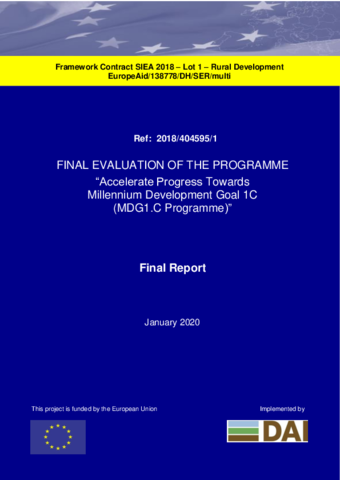
The Programme was implemented by the RBA under the coordination of the Mozambican Technical Secretariat for Food and Nutrition Security –SETSAN. The overall objective of the programme was to contribute to the “Acceleration of attainment of MDG 1c: Halve between 1990 and 2015 the portion of people who suffer from hunger in Mozambique”. The evaluation was carried out in 2019.
The main objective of this evaluation was to assess the past performance of the MDG1c Programme, paying particular attention to its results measured against its objectives and key lessons and recommendations to improve current and future actions. The evaluation followed the OECD/DAC criteria: relevance, effectiveness, efficiency, impact and sustainability plus a set of humanitarian assistance evaluation criteria (timeliness, targeting, modality, and coverage).
Some of the conclusions of the evaluation were: (1) The programme has been highly relevant to the needs of the country, in terms of addressing the prevailing high levels of food insecurity and malnutrition, particularly in rural areas; (2) The programme’s interventions have generated significant improvements on agricultural and fishery production, nutrition knowledge and to lower extent on health and nutrition practices, among beneficiaries; (3) The multisectoral approach of the programme and the set of interventions selected have the potential to contribute significantly to the improvement of food and nutrition security at household level; (4) The incorporation of the gender dimension across the programme cycle was not homogeneous, and was particularly weak in the design phase; (5) The programme addressed environment and climate change issues at the results components level but did not adopt a specific strategy to enhance disaster risk preparedness capacity of communities to face natural disasters and extreme events.
The evaluation recommended that the EU strategy to rural development in Mozambique continues to focus on food and nutrition security ensuring synergies and complementarity among interventions on food production, access and nutrition through options such as: (i) Strengthening district-level multisectoral planning process and aligning multisectoral programmes to context specific analysis of main causes of food insecurity and malnutrition; (ii) Enhancing nutrition sensitiveness of the productive and market-oriented investments by promoting production, processing and marketing of more nutritious foods; (iii) Ensuring a robust monitoring and evaluation system in the design of the interventions, to build evidence on the effectiveness of multisector nutrition-sensitive interventions.
The evaluation recommended the integration of emergency support with long-term approaches to food security such as: (i) Ensure response options are based on appropriate needs assessments of the affected people; (ii) Focus food assistance on increasing resilience of communities in the long-term through asset creation at both community and household level and development of human and social capital immediately after life-saving assistance and (iii) Coordination and involvement of development sectors from the early stages of emergencies to ensure sustainable long-term interventions.
